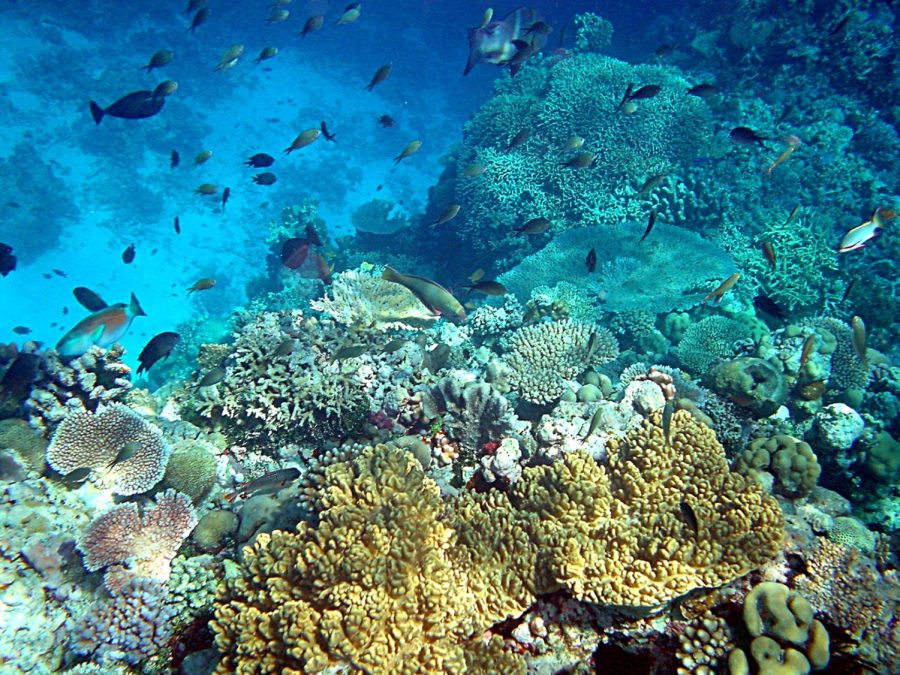Coral Reefs: Save Them Before They Are Gone
A coral reef surrounded by fish.
May 3, 2022
Coral reefs have been around for more than 400 million years and have been keeping our oceans clean, providing humans and other animals with safety, and giving us a source of food, but at this rate, coral reefs may go extinct and all of those benefits will disappear.
Coral reefs are massive underwater structures comprised of hundreds or thousands of tiny animals called polyps which have a soft body, but a hard, limestone outer shell. Coral reefs typically live in shallow waters that range in temperature from 68°F to 97°F. Also, coral is one of the slowest growing creatures on the planet according to marineinsight.com.
Coral is extremely sensitive to environmental changes, therefore, minute changes can cause harm to the coral. The reason for this is that when water heats up, the coral releases the colorful algae which normally lives on it. According to scied.ucar.edu, the coral actually becomes transparent and therefore you can see the skeleton of the animals.
The largest coral reef in the world is The Great Barrier Reef. The Great Barrier Reef sits off the northern coast of Australia and stretches for almost 1,500 miles. It is the largest structure made by living organisms and can even be seen from outer space!
Coral has a huge role to play in our oceans. For example, coral reefs provide a buffer for shorelines so that waves and storms do not cause as much beach erosion or property damage. Furthermore, coral reefs house about a quarter of marine life. Because coral reefs support fish and other sea creatures, humans can use that as a sustainable food source. Also, coral reefs act as a water filtration system and make the water cleaner and clearer according to healthyoceanshealthypeople.org. Finally, coral reefs regulate the amount of carbon dioxide in the oceans. Too much carbon dioxide in the environment negatively affects all organisms in one way or another.
Despite all of these benefits, humans continue to contribute to the conditions that cause these coral reefs to bleach. Although this bleaching does not kill them directly, it does put them at a higher risk for starvation and disease which would cause them to die.
The largest factor for coral reef bleaching is rising water temperatures which are caused by climate change. Another one of these reasons is runoff and pollution. Lastly, overfishing and environmental destruction may cause bleaching. According to csmonitor.com, fish release a chemical called ammonium through their gills which is essential for coral growth. Losing more and more fish will be devastating for these coral reefs.
So, what can humans do to save these beautiful creatures? Well, there are many ways according to conserve-energy-future.com.
- Refrain from using pesticides and fertilizers. Even the smallest amounts of these chemicals in the water can cause extremely destructive effects on coral reefs. Even if your residence is not on the coast, these fertilizers and pesticides will find a way to get to the ocean (typically by rainwater).
- Educate yourself. Once you know how important and fragile these organisms are the more gratitude you will have for them.
- Reduce the amount of pollution. Recycling and disposing of trash correctly is one of the easiest and most helpful ways to help save coral reefs. You can also make sure to turn off all lights that are not in use.
- Reduce runoff. Collecting rainwater and planting trees are a couple of ways of doing that. Runoff carries materials through rainwater to different areas. Sometimes this runoff can carry pollutants and other harmful materials.
According to reef-world.org, if humans continue to contribute to these harmful conditions, all coral reefs are expected to die by 2050 and when the coral reefs die, so will many animals that rely on them to survive. Moreover, around one billion people rely on coral reefs as a source of food, income, and safety from harsh storms. Clearly, the loss of these coral reefs will be catastrophic because of the effects on not just wildlife but also humans.
Saving coral reefs is a necessity for our environment and for humanity’s own good.













Molly Carney • May 4, 2022 at 10:08 am
Will, you have given us great information on how, we as humans, can help to preserve these beautiful coral reefs. I never realized the part we play in the bleaching of reefs. They are beautiful works of nature that should be protected!
Norris Myers • May 3, 2022 at 5:37 pm
It is sad to think we could be losing our coral reefs. Thanks, Will, for your informative article and for sharing ways we can keep coral reefs thriving.